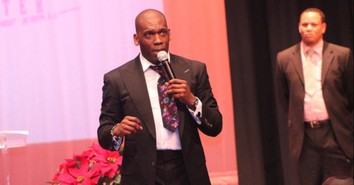How My Evangelical Church Taught Me Not to Trust Myself, and How I Am Healing from It

One of the hallmark characteristics of someone who has been spiritually abused is that they do not trust themselves.
They second guess every decision they make, in case it is secretly sinful. They feel too fearful to speak up when they feel like something is wrong. They feel out of touch with their own bodies and what their bodies are telling them about what they are experiencing.
This has been one of the deepest wounds for me to heal, but the one that has made me feel the most empowered as a daughter of God. I would love to share with you how spiritual abuse disconnected me from my intuition and how I am slowly taking it back.
1. Continually Being Told That My Heart Is Deceitful
Jeremiah 17:9 says, “The human heart is the most deceitful of all things, and desperately wicked. Who really knows how bad it is?” (NLT). I could tell you what that Scripture says in my sleep because it was repeated to me or others around me so frequently as a young Christian.
The principle that was trying to be expressed was at least somewhat true. Our emotions don’t always tell us an accurate picture. Sometimes our hearts lead us astray if we are being unwise. But this verse was used more like a trump card to tell me to stop thinking independently and get in line.
It was used in sermons to make sure the congregation knew that they should question their every heart’s motive, especially if a decision didn’t look like the most “spiritual” one. It was used on young Christians when they would question how the church interpreted a specific verse. Or it was used when someone would think about dating someone they liked outside of the church.
Even if it was never used in a harsh, outright controlling way, the damage was still done. The fear was still instilled that my heart was deceitful, and I could not even trust my thoughts because I was so sinful. Constantly second-guessing myself took a profound toll.
2. Continually Being Told That I Was Being Proud if I Disagreed
I don’t want to downplay the insidious nature of pride. Pride does harden hearts; pride does cause us to turn away from God. But in my experience of being taught about pride, it was like this heavy rock that you could never shake. Not only was your heart deceitful, but it was also so proud that you couldn’t even see your pride.
Psalm 73:6 was often misused to tell us that our pride was like a necklace, and therefore we couldn’t see it. So if someone said you were being proud, you better believe them because you weren’t able to see your own pride.
If someone disagreed with your vacation plans, your choice of job or your attitude and confronted you about it, checking your own heart for its real motivations wasn’t an option. Because your heart couldn’t be trusted, remember? And because you can’t see your pride, you wouldn’t have an accurate assessment of your motives anyway.
This was especially damaging when it came to disagreeing with leadership. If I did, I would always automatically assume that it was just my heart being proud, and I should just be “humble” and get over it. This caused me to ignore red flags, even my own gut feelings about what leadership was doing or saying. I felt like if I were to speak up, I would just be told I was being proud and then get shut down. So I just kept quiet, to my own detriment and the detriment of others.
Pride is deceptive. But Jesus died to give us a new heart, one that can be trusted.
3. Over-Emphasizing Getting “Advice” That Was Really Permission
The Bible is full of Scriptures about getting advice. The Proverbs especially highlight how advice brings wisdom and victory. But in my spiritually abusive environment, getting advice was emphasized to a point where it was almost like we had to get permission for everything.
Who to date, how to date them, if you were “allowed” to miss small group for a family event, etc. I won’t harp on this, but this attitude created an environment of fear and mistrust for oneself and the frequent action of being told to get advice from higher-ups about every little thing all sent the message that you are no good. Your heart is no good. You are only wicked, your heart is only lying to you, and anything you think is wrong with what leadership is doing is probably just because you were proud.
Of course, this wasn’t ever explicitly stated. But like all abuse, a little at a time will dehumanize you.
But I am taking my power back. Here are three ways how:
1. I Am Learning to Set Boundaries and Speak Up When Violated
Spiritual abuse conditioned me to ignore red flags and to let others violate my boundaries – of privacy, agency and my gut instinct. So I am learning to tune in when my gut is telling me something and make my boundaries known.
One of the things I admire most about my 10-month-old niece is how quickly she speaks up when she doesn’t like something. She has no problem making that known. So I aspire to be like that when my roommates leave a common area messy, when someone makes an empty apology, or when I feel like I’m being manipulated. I make meetings with church leadership to share my opinions, and, most importantly, I do the inner work to believe that I’m worthy of having my boundaries protected.
2. I Take Regular Sabbaths
The concept and practice of the sabbath have absolutely changed my life. It’s a weekly, tangible reminder that not only is God in control and worthy to be trusted, but that he wants me to enjoy good things. And I get to have agency over that time, and no one can tell me I’m doing it wrong.
There is such a beautiful connection between finding out the things that you love, and then getting to know yourself through those things, and then getting to know God deeper as a result. So every sabbath, I get to just ask myself what I really want to do that day, and then I enjoy the presence of God as I do it.
The practice of tuning in to what I really want is helpful in itself. It reminds me that I am capable of wanting good things – that my heart isn’t just wicked and proud all of the time. And then all of the benefits of trusting God in the sabbath just stack upon that.
3. I Am Relearning God’s Character
Constantly keeping my heart in check and second-guessing my every motive painted a picture of a God who was just waiting for me to mess up. I believed that God was distant and continually disappointed in my arrogant heart. Being “humble” was self-lacerating, and I thought that maybe if I confessed enough vulnerable sin, if I just trusted leadership and did what they told me and ran myself into the ground trying to do enough to appease Him, maybe I could relax in His love … eventually.
Learning, knowing and experiencing God as Father has been life changing. I can truly say that God is my friend. I know that He is bursting with pride over my life and decisions and is holding my hand through the darker times.
I can trust my heart because I can trust a good God. He will point it out to me if I am being arrogant. His Spirit will guide me if I really do need to just be quiet over an issue. But true humility with people starts with humility with God, but it is impossible to surrender to someone you don’t trust.
The more I learn about this God who is sweet and epic and loves me to pieces, the more power I feel in my walk with Him. I don’t second guess it. I enjoy it. And I hope I help others to do the same.
The views expressed in this commentary do not necessarily reflect those of Christian Headlines. Used with permission.
Photo courtesy: ©Getty Images/Predrag Images
The views expressed in this commentary do not necessarily reflect those of CrosswalkHeadlines.
Kelly-Jayne McGlynn is a former editor at Crosswalk.com. She sees the act of expression, whether through writing or art, as a way to co-create with God and experience him deeper. Check out her handmade earrings on Instagram and her website for more of her thoughts on connecting with God through creative endeavors.
Originally published February 07, 2022.





